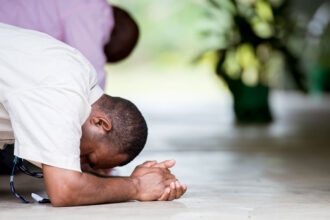“Kagame, don’t you ever judge anyone because of his/her situation; either on the road, bus or even in the church in whatever situation one might be. People are suffering outside here and not even the victim himself/herself is aware” That was my friend’s statement.
It is very true that people are sick due to different reasons. The economic status, family issues, and even the previous covid-19 pandemic have made life miserable to many to a point of becoming sick mentally and many have committed suicide due to it while others are living in denial and pain within.
Among the problems that many are suffering from is Post-traumatic stress disorder (PTSD); which many people may not understand or be aware of it.
Post-traumatic stress disorder (PTSD) is a mental health problem that develops in some people who have experienced a shocking, scary, or dangerous event such as war and combat, domestic violence and abuse, natural disasters, or experiencing mass violence.

The most affected are men and women of the uniform, hospital/medical workers and the inmates. Security officers like the Army and others are exposed to traumatic events during war; especially like now they are in Somali and other places within our orders. They have been fighting Alshabbab, Bokoharam and other militia groups. In such situation, many fall in the hands of the enemies and dies while the witness will forever live in trauma.
Combat creates life-threatening situations, injuries and accidents. Service members may see others hurt or killed. They may have to kill or wound others. They are on alert around the clock. These and other factors can increase their chances of having PTSD or other mental health problems. Others can be affected by being away from home for long periods of time and especially the young families; missing their spouses, children and parents for a long period can cause problems at home or work. That is why many of them either ends up committing suicides or even forwarding themselves to the enemies to be killed. Again, problems can add to the stress to our officers. Some may suffer when they lose their loved ones without attending their burials, transfers and lack of financial support to their families.
This can be treated but in a very systematic way. After a traumatic event, or trauma, it’s normal to think, act and feel differently than usual. Most people will start to feel better after a few weeks. If the symptoms still bother after a month, are very upsetting, and disrupt one’s daily life, it’s time to consider getting treatment. Whether or not one have PTSD, if thoughts and feelings from the trauma are bothering, treatment can help.
Some of the recommended methodologies for healing could be taking a first step by talking with:
- Your family doctor or primary care provider.
- A mental health professional, such as a therapist or counselor.
- Someone who works at your station facility or security care center, if you are a security officer.
- A close friend or family member who can support you while finding help
- A clergy member for divine wisdom and nourishment.
To the health workers, they are not spared from this. In the frontline of the pandemic stand healthcare workers and public service providers, occupations which have proven to be associated with increased mental health problems during pandemic crises.
Health workers and public service providers are experiencing high levels of PTSD symptoms, anxiety and depression during the COVID-19 pandemic. Health workers especially those who directly worked with COVID-19 patients have significantly higher levels of PTSD symptoms and depression compared to those working indirectly.
Therefore it is very prudence to say that appropriate action to monitor and reduce PTSD, anxiety, and depression among these groups of individuals working in the frontline of pandemic with crucial societal roles should be taken immediately. The management of the Health workers in the country as well as the government, local and national government must look for the avenues and have a center or crisis line so as to handle this before it goes to uncontrollable stage.

In particular, these workers are vulnerable to developing post-traumatic stress disorder (PTSD) symptoms. PTSD is a mental health problem that affects people who are exposed to potentially traumatic episodes. Healthcare workers are exposed to increased danger of contamination, loss of patients, responsibility for difficult decisions on treatment retention, and disruption of normal supportive structures.
PTSD symptoms are grouped into 4 clusters: re-experiencing, avoidance, negative cognitions and mood, and arousal, and can be develop more as the problem persist. The estimates of PTSD symptoms among healthcare workers are higher compared to the general population and range from 6–10% in a recent COVID-19 survey conducted in Singapore, 18% from nurses working in hospitals in general, and 20% from the Severe Acute Respiratory Syndrome (SARS) outbreak. Thus, PTSD symptoms appear to be higher during pandemics compared to periods without extraordinary situations.
The levels of PTSD symptoms, anxiety, depression and health anxiety among health personnel and public service providers are high where females seems to be highly affected than males.

Health workers and public service providers have markedly high levels of PTSD symptoms, anxiety and depression during the COVID-19 pandemic. Those working directly with COVID-19 patients have significantly higher levels of PTSD symptoms and depression compared to those working indirectly. These increases in symptoms are markedly higher than estimates from pre-pandemic populations, suggesting that this issue may be a major cause for concern. Special care should be taken to assess the level of PTSD symptoms among both health personnel, our security personel, and public service providers in the forthcoming period. Appropriate action to monitor and reduce PTSD, anxiety, and depression among these groups of individuals working in the frontline of pandemic with crucial societal roles should be taken immediately.
“Trauma does not have to occur by abuse alone…” Asa Don Brown.









Yes..PTSD is real and poses a threat in the well being of our society..so let’s embrace one another, check out to that family or friend who suddenly has gone silent…
Speak out…especially men who keep to themselves…
..lets identify and Connect those who are suffering to a source of help for our better tomorrow…
I need you and you need me…
Rich out n help out…
Shalom